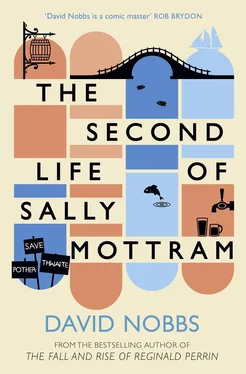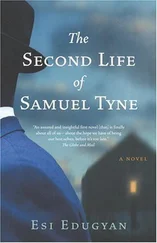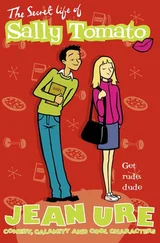‘No. Not at all. Not at all. It was my husband’s funeral.’
‘Oh no. I’ve done it again. I’m so sorry.’
‘It’s all right, but …’
‘You want to cry. I understand. And I agree. Don’t hold it in. That’s trouble wi’ Potherthwaite. We hold too much in. Let it all out, I say.’
Long Raincoat moved away, and this time he didn’t turn back. Sally looked out over the grey town, and thought about his words. ‘Bit of a dump, I suppose, but what somebody could do with it!’ She shook her head at the impossibility, the absurdity of the sudden thought.
She looked over at the church. She thought of herself and Alice as Long Raincoat must have seen them. A lovely couple. Yes, they must have looked a lovely couple.
She hadn’t felt lovely, that day. She’d hardly slept. She’d felt that she looked haggard. The service had been a total embarrassment. So much was said. So much wasn’t said. The Revd Dominic Otley had spoken without conviction. The funerals of people who have killed themselves are hell.
And Alice. She had been lovely. She had grown into a really lovely woman, a proud mother of two lovely little boys. It was lovely that she had such lovely photos of them, and if perhaps she showed them slightly too often, well, it was good at a funeral to dwell on things that cheered, it would be wrong to criticize her for that. No, the only thing that had disappointed her about Alice was the thing she hadn’t said. She hadn’t suggested that Sally move to New Zealand. She understood why, it made sense. She had her own life. She had the boys. She didn’t know whether, if Alice had asked her, she would have gone. Some people said New Zealand was a paradise. Others said it was boring. Perhaps it was in the ineluctable nature of things that paradises were boring. No, she didn’t know if she would have gone, but it would have been nice to have been asked.
Sam hadn’t sung the praises of Barnet, either.
She took one more look at the roofs of her home town, at a faint sheen from the emerging sun on the one tiny glimpse she could get of the Potherthwaite Arm of the Rackstraw and Sladfield Canal.
Beyond and above the canal and the Quays, on the moor at the other side of the valley, Potherthwaite Hall stood arrogant guard over the town. It had only occurred to her well after Barry’s death that this year they hadn’t been invited to Councillor Stratton’s party.
She set off at last, slowly wheeling her two suitcases to the northern end of the footbridge. She pressed for the lift. It arrived slowly. ‘Footbridge level,’ exclaimed the bossy lady. Sally manoeuvred her cases into the lift. ‘Going down.’ She went down.
She wheeled her cases towards the ramshackle buffet, then hesitated. She didn’t want to go into the buffet, in case Long Raincoat would be there.
But there was another reason too. She didn’t need a vat of tea or a cauldron of coffee. She didn’t need a Danish pastry or a slice of fruit cake.
She didn’t need anything. She was going south, to the Land of Plenty.
TEN
A small flat in Barnet
Beth’s lasagne wasn’t exactly bad. She was an inexperienced cook – they lived mainly on ready meals and takeaways – but it was clear to Sally that Sam had told her that his mother would expect real cooking. She wished he hadn’t done that. She had quite lost her appetite since Barry’s death, and she knew that she had to eat up all her lasagne. It was a neat reversal of her relationship with her son. She had spent hours getting him to eat up, in the happy years.
‘The happy years’! What did she mean? Hadn’t she been happy throughout her marriage? She had thought that Barry had been too, but … consulting a psychoanalyst? Killing himself? And why oh why had he not left her a suicide note? To go, to hurt her so, without a word.
This was awful. This was not why she had come to stay with Sam and Beth. She had come to begin to recover from her trauma. She had come, with Barry dead and Alice in New Zealand, to find some family feeling, some family warmth.
‘Lovely.’
‘Do you mean that?’ asked Beth naively.
‘It’s very good.’
‘It is, Beth,’ said Sam. ‘Really. Beth has no confidence, Mum.’
Beth gave Sam a glare, which she turned into a comedy glare to try to hide the fact that it was a real glare. She wasn’t unattractive, but you couldn’t say she was beautiful. She’s a bit like her lasagne, thought Sally, and then she wished that she hadn’t, but you can’t unthink a thought.
She was ashamed of herself for wishing that her son had found somebody more glamorous. She was ashamed of herself for wishing that he had got a better degree from a better university and had a better job.
They were sitting on wooden chairs at a square, battered table in a corner of the small lounge/diner of their tiny rented flat in a street of small pre-war houses in Barnet. There were two round marks on the tabletop, where hot mugs had been put down without protection. Sally found herself wondering which of them had left the careless marks. She hoped it wasn’t her son, he had been well brought up.
She calculated that she was now more than halfway through her lasagne. She could make it through to the end. And there came to her at that moment a sudden memory of Potherthwaite, the last thing she wanted to remember. Hadn’t she in part come here to forget? Marigold had suggested, at the funeral wake of all places, that they go out to lunch together, damsels in distress, to cheer themselves up. There was a special Pensioners’ Lunch Offer at the Weavers’ Arms on Thursdays, and they had decided to cheer themselves up by going there and perhaps being the youngest people in the room.
Seated at the next table had been Jill and Arnold Buss, with their new neighbours, Olive and Harry Patterson. Jill, who knew Sally, had introduced Olive and Harry. At the end of the meal, Harry and Arnold had gone to the bar to dissect the bill, Jill had gone to the loo, and Sally and Olive had met at the coats, and as Sally had helped Olive on with her coat, she had praised the beef casserole, and Olive had told her about having to finish the beef casserole at Jill and Arnold’s when it was too spicy for her. ‘I shouldn’t have told you. They were very kind. Please don’t mention it,’ Olive had said hastily as the men returned. Sally had thought this a very trivial story, but now she was beginning to sympathize with Olive.
Thinking back to Potherthwaite led her inexorably back to Barry. Oh God, she missed him. Had he not known, how could he not have known, how much she would miss him? How could he do it to her?
‘Really lovely.’
It would have been better not to say that. It would draw their attention to the slow speed of her consumption, the almost desperate working of her jaw.
She felt guilty about wishing that Sam didn’t look so pale and thin. It made him look too tall, a beanpole. It made his nose look too long and too serious. She felt uneasy about being so disappointed that Beth wasn’t taller, and had such heavy breasts. She told herself that it was unreasonable of her to hope that they would soon move to somewhere more exciting than Barnet. Poor Barnet, how could it live up to her picture of ‘The South’, that mythical place she had missed so badly for twenty-four years? Every now and then she made some kind of reply to some kind of remark, but afterwards she couldn’t remember what they had talked about, she could only remember what she had thought. It wasn’t that Barnet was ugly exactly, it was just … commonplace. Ordinary. Rather like Beth and the lasagne, really.
Beth had left the lasagne in the oven too long, perhaps less than two minutes too long. But that was the trouble with pasta, leave it a smidgen too long and it went heavy, solid, stolid. As she chewed, she saw Olive chewing, and she was back in Potherthwaite again. This was terrible. Oh, why hadn’t he left a note?
Читать дальше












